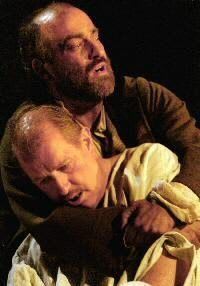The RSC's Lear does two important things: it re-establishes the company's credibility as a producer of Shakespeare's tragedies after its disappointingly ordinary Macbeth and it makes us question the easy assumption that we know what tragedy is.
Let's take the latter first. The Aristotelian theory of the great man brought low by a "fatal flaw" (hamartia) simply doesn't apply here. How can Lear be described as a "great man"? He is great in terms of his position in society, of course - after all, he is the king - but there is no greatness of character, of moral stature, courage or intellect; nothing which we might describe as being "larger than life". Except, perhaps, that very flaw which brings about his downfall.
Corin Redgrave - in a magnificent performance - plays him as a petulant child, determined to have his own way, who develops, learns, even grows up through suffering. Truly the ripeness is all. And to me the truth of Gloucester's words never came over so strongly:
As flies to wanton boys are we to the gods;
They kill us for their sport.
Here is the essence of the tragedy: Lear's petulant childishness is a reflection of the macrocosm. What he unleashes when he rejects Cordelia finally brings him down, just as the evil Macbeth unleashes by giving in to the blandishments of the evil within him (as represented outwardly by the witches) brings him crashing down.
As the lights dimmed to blackout on Albany's final speech, there was a long, stunned pause before the applause began, tentatively at first, then swelling to full volume. Richly deserved: this was a fine production of what is surely one of the most difficult of Shakespeare's plays. Redgrave's performance was superb but Louis Hilyer's Kent was not far behind and his "Vex not his soul" speech was deeply moving. I took a little time to warm to Pal Aron's Edgar: the bookish image he projected at first seemed to my eyes a little odd, although justified by the text, but as Poor Tom and then as the matured version of himself at the end he was compelling. As his half-brother Edmond, Matthew Rhys, although a convincing villain, lacked, for me, the sensuality, even sexuality, which should make Gonerill and Regan's lust for him inevitable. Yes, he was younger and better looking than their husbands but this did not of itself seem sufficient to ignite such passion.
We had an understudy as the Fool: Leo Wringer, who normally plays Albany (and who "rescued" Nottingham Playhouse's Othello last year), played him with a Jamaican accent which meant that, very occasionally, we lost a few words but it did add to the black (definitely no pun intended!) humour of the part. Somehow it seemed to point up the sadness which is the basis of the character.
As for the women, Sian Brooke in her debut season with the company gave us a Cordelia with a little more steel than usual, whilst another debutante, Ruth Gemell, gave Regan a coldness which really did chill. Emily Raymond's Gonerill had a smouldering depth quite at odds with her sister's coldness.
As for David Hargeaves' Gloucester, he caught exactly the confusion of the innocent torn by his loyalty to the state on the one hand and to his old friend the King on the other.
Special mention should be made of the very, very subtle (although, in the storm on the heath sequence, extremely loud!) soundscape produced by David Tinson, which, coupled with the music of Jonathan Goldstein, added an almost subliminal sense of menace. All in all, as my colleague Steve Orme said in his review of the same production at Stratford, Bill Alexander's production shows the RSC very definitely back on form.
Philip Fisher also reviewed this production at the Albery.
